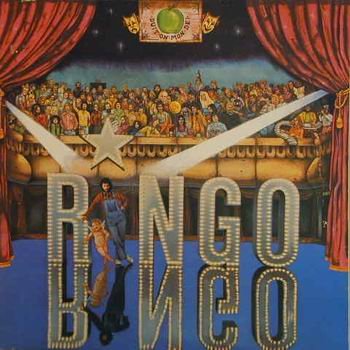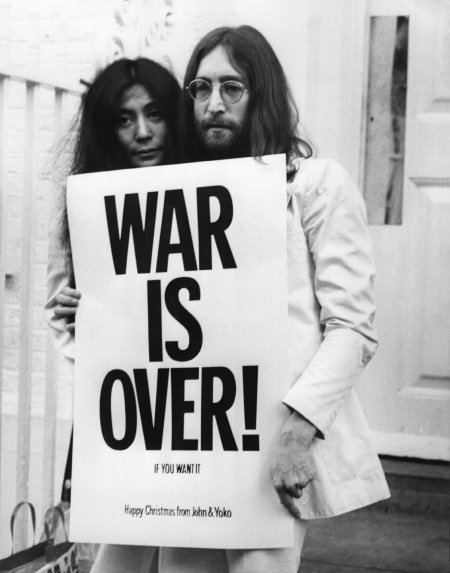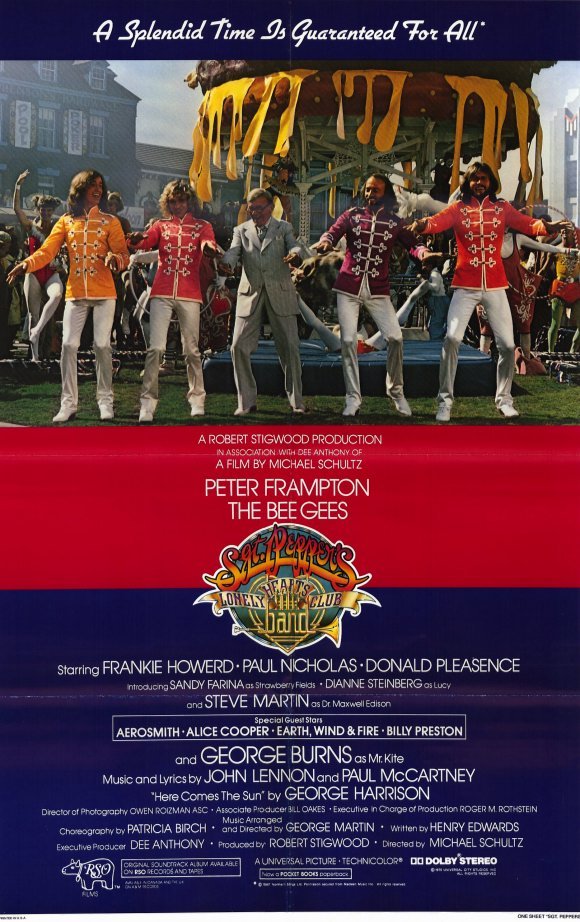FAB FOUR F.A.Q. 2.0: Life After Beatlemania, From Multiple Angles
Being an ex-Beatle in the 1970's was both a blessing and a curse. Each former Fab had the advantage of the commercial cachet that came with being part of the most successful and influential group in pop music history. However, each ex-Beatle also had the disadvantage of living under the towering shadow of that past success and trying to reestablish themselves in the eyes of a record-buying public that was disillusioned by their breakup.Similarly, anyone looking to write a book on the Beatles is in a position almost as tough as the one the ex-Beatles founds themselves in during the 1970's. The history of the group and each individual member has been combed through, chronicled, analyzed, satirized and reexamined several times over. Finding a fresh hook for such frequently explored material seems impossible but Robert Rodriguez has managed to pull this tricky feat off with Fab Four FAQ 2.0. This sequel to his earlier exploration of the Beatles' career succeeds where a lot of Beatles-retrospective books fail because it is actually several books at once: it is a history, a source of trivia and a critical guide to the ex-Beatles music, films and t.v. appearances all in one carefully-assembled tome.Part of the appeal of this book comes from the way it is organized. Its reams of info are broken down into 33 meticulously organized chapters. Eleven of these chapters devote themselves to a year-by-year survey of the personal and professional events in lives of the ex-Fabs and they act as a sort of narrative anchor for the book. The other twenty-two chapters intersect with these capsule histories in a variety of ways, exploring their music, their ventures into other forms of media, their collaborations and their feuds.
Finding a fresh hook for such frequently explored material seems impossible but Robert Rodriguez has managed to pull this tricky feat off with Fab Four FAQ 2.0. This sequel to his earlier exploration of the Beatles' career succeeds where a lot of Beatles-retrospective books fail because it is actually several books at once: it is a history, a source of trivia and a critical guide to the ex-Beatles music, films and t.v. appearances all in one carefully-assembled tome.Part of the appeal of this book comes from the way it is organized. Its reams of info are broken down into 33 meticulously organized chapters. Eleven of these chapters devote themselves to a year-by-year survey of the personal and professional events in lives of the ex-Fabs and they act as a sort of narrative anchor for the book. The other twenty-two chapters intersect with these capsule histories in a variety of ways, exploring their music, their ventures into other forms of media, their collaborations and their feuds. Armchair musicologists will delight in the musically-minded chapters, which break down each man's respective solo catalogs in a variety of ways: biggest and lowest-charting singles, best and worst albums, the #1 hits, etc. These chapters aren't mere "listicles," either: Rodriguez goes into great detail about the stories behind the songs and albums. His penchant for thorough behind-the-scenes detail really yield dividends in the chapters where he explores the group's collaborations with other artists and their unreleased recordings: highlights include the tale behind an abortive, oft-bootlegged studio jam between Lennon and McCartney in 1974 and the story about "Too Many Cooks," Lennon's unreleased collaboration with Mick Jagger.
Armchair musicologists will delight in the musically-minded chapters, which break down each man's respective solo catalogs in a variety of ways: biggest and lowest-charting singles, best and worst albums, the #1 hits, etc. These chapters aren't mere "listicles," either: Rodriguez goes into great detail about the stories behind the songs and albums. His penchant for thorough behind-the-scenes detail really yield dividends in the chapters where he explores the group's collaborations with other artists and their unreleased recordings: highlights include the tale behind an abortive, oft-bootlegged studio jam between Lennon and McCartney in 1974 and the story about "Too Many Cooks," Lennon's unreleased collaboration with Mick Jagger. Rodriguez proves equally adept at sizing up the ex-Fabs work on television and in films: he makes a good case for how That'll Be The Day shows that Ringo could have had a legit acting career if he'd really wanted one and offers fascinating descriptions/analyses of John Lennon's controversial early-1970's t.v. appearances with Yoko Ono. On a similar track, there is a fascinating chapters chronicling shows and events that attempted to explore (or exploit) the public's nostalgia for the Beatles (yes, it includes a look at the infamous 1978 film-musical stinker Sgt. Pepper's Lonely Hearts Club Band - and that entry offers an insightful, well-informed analysis of the circumstances that made it such a fiasco).
Rodriguez proves equally adept at sizing up the ex-Fabs work on television and in films: he makes a good case for how That'll Be The Day shows that Ringo could have had a legit acting career if he'd really wanted one and offers fascinating descriptions/analyses of John Lennon's controversial early-1970's t.v. appearances with Yoko Ono. On a similar track, there is a fascinating chapters chronicling shows and events that attempted to explore (or exploit) the public's nostalgia for the Beatles (yes, it includes a look at the infamous 1978 film-musical stinker Sgt. Pepper's Lonely Hearts Club Band - and that entry offers an insightful, well-informed analysis of the circumstances that made it such a fiasco). However, the most fascinating and valuable chapters might be those that explore the personal interactions between the former bandmates. Chapters on their post-Beatles collaborations and - even more interesting - their feuds over the years are engrossing reads that offer up all the pertinent details behind each incident without devolving into tabloid-style innuendo. A chapter on the romantic involvements of the Fabs is done in a similarly informative yet classy style and the closing chapter about Lennon's untimely death is handled with a well-judged sensitivity, focusing on Lennon's schedule that day and the reactions of each of his former bandmates.And for those wondering why a Beatles book is being covered on a schlock site, well, Rodriguez never shies away from schlock when it pops up. Each of the ex-Beatles made some questionable career choices that came back to
However, the most fascinating and valuable chapters might be those that explore the personal interactions between the former bandmates. Chapters on their post-Beatles collaborations and - even more interesting - their feuds over the years are engrossing reads that offer up all the pertinent details behind each incident without devolving into tabloid-style innuendo. A chapter on the romantic involvements of the Fabs is done in a similarly informative yet classy style and the closing chapter about Lennon's untimely death is handled with a well-judged sensitivity, focusing on Lennon's schedule that day and the reactions of each of his former bandmates.And for those wondering why a Beatles book is being covered on a schlock site, well, Rodriguez never shies away from schlock when it pops up. Each of the ex-Beatles made some questionable career choices that came back to  haunt them and there is also plenty of coverage on attempts to exploit the Beatles' mystique. Highlights on the schlock tip include the story behind Ringo's appearance in the spaghetti western Blindman, the aforementioned exploration of the awful Sgt. Pepper's movie as well as details about the stage show that spawned it, a look at John Lennon's awkward radical-chic album Some Time In New York City and the story behind Alpha-Omega, a bootleg Beatles comp that inspired Capitol to begin a series of Beatles repackages.To sum up, Fab Four FAQ 2.0 is a true work of pop scholarship. It would take tons of collecting and reading to find all the information that is covered so succinctly here. Better yet, this book is as accessible as it is impressive. It's organization scheme allows to deliver plenty of enlightment whether it is read in a start-to-finish style or just thumbed through in a casual manner. If you want to understand the twisty-turny path that the former Beatles had to navigate to find success in a post-Fabs world, Fab Four FAQ 2.0 is an ideal place to begin.
haunt them and there is also plenty of coverage on attempts to exploit the Beatles' mystique. Highlights on the schlock tip include the story behind Ringo's appearance in the spaghetti western Blindman, the aforementioned exploration of the awful Sgt. Pepper's movie as well as details about the stage show that spawned it, a look at John Lennon's awkward radical-chic album Some Time In New York City and the story behind Alpha-Omega, a bootleg Beatles comp that inspired Capitol to begin a series of Beatles repackages.To sum up, Fab Four FAQ 2.0 is a true work of pop scholarship. It would take tons of collecting and reading to find all the information that is covered so succinctly here. Better yet, this book is as accessible as it is impressive. It's organization scheme allows to deliver plenty of enlightment whether it is read in a start-to-finish style or just thumbed through in a casual manner. If you want to understand the twisty-turny path that the former Beatles had to navigate to find success in a post-Fabs world, Fab Four FAQ 2.0 is an ideal place to begin.


